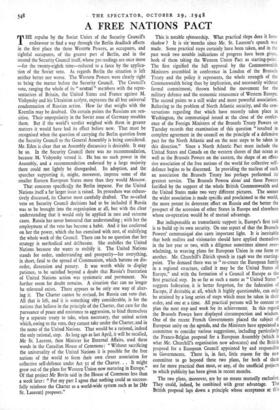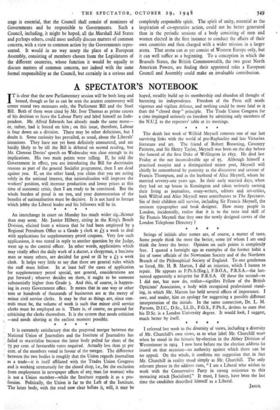A FREE NATIONS PACT
THE repulse by the Soviet Union of the Security Council's endeavour to find a way through the Berlin deadlock affects in the first place the three 'Western Powers, as occupants, and rightful occupants, of the greater part of Berlin, and in the second the Security Council itself, whose pro:eedings are once more —for the twenty-eighth time—reduced to a farce by the applica- tion of the Soviet veto. As regards Berlin the situation is left neither better nor worse. The Western Powers were clearly right to bring the matter before the Security Council. The Council's vote, ranging the whole of its " neutral " members with the repre- sentatives of Britain, the United States and France against M. Vishynsky and his Ukrainian acolyte, expresses the all but universal condemnation of Russian action. How far that weighs with the Kremlin may be doubted. On certain points the Russians are sen- sitive. Their unpopularity in the Soviet zone of Germany troubles them. But if the world's verdict weighed with them in greater matters it would have had its effect before now. That must be recognised when the question of carrying the Berlin question from the Security Council to the General Assembly is being considered. Mr. Eden is clear that an Assembly discussion is desirable. It may be so. In the Security Council there was no recommendation, because M. Vishynsky vetoed it. He has no such power in the Assembly, and a recommendation endorsed by a large majority there could not lightly be disregarded. Its adoption, and the speeches supporting it, might, moreover, impress some of the smaller Eastern European States more than they would Moscow.
That concerns specifically the Berlin impasse. For the United Nations itself a far larger issue is raised. Its procedure was exhaus- tively discussed, its Charter most carefully drafted. The so-called veto on Security Council decisions had to be included if Russia was to be brought into the organisation at all, but with the clear understanding that it would only be applied in rare and extreme cases. Russia has never honoured that understanding ; with her the employment of the veto has become a habit. And it has conferred on her the power, which she has exercised with zest, of stultifying the whole work of the Council. There can be no question that her strategy is methodical and deliberate. She stultifies the United Nations because she wants to stultify it. The United Nations stands for order, understanding and prosperity—for everything, in short, fatal to the spread of Communism, which battens on dis- order, dissension and penury. It was worth while to display patience, to be satisfied beyond a doubt that Russia's frustration of United Nations action was systematic and permanent. No further room for doubt remains. A situation that can no longer be tolerated exists. There appears to be only one way of alter- ing it. The Charter cannot be revised, for Russia can veto that. All that is left, and it is something very considerable, is for the nations that believe in the principle of the Charter, that care for the pursuance of peace and resistance to aggression, to bind themselves by a separate treaty to take, when necessary, that united action which, owing to the veto, they cannot take under the Charter, and in the name of the United Nations. That would be a rational, indeed the only rational, step. As long ago as last April, it will be recalled, Mr St. Laurent, then Minister for External Affairs, used these words in the Canadian House of Commons: "Without sacrificing the universality of the United Nations it is possible for the free nations of the world to form their own closer association for collective self-defence under Act 51 of the Charter. . . It might grow out of the plans for Western Union now maturing in Europe." Of that project Mr Bevin said in the House of Commons less than a week later : "For my part I agree that nothing could so success- fully reinforce the Charter as a world-wide system such as he [Mr St. Laurent] proposes." This is notable sponsorship. What practical steps does it fore- shadow ? It is six months since Mr. St. Laurent's speech was made. Some practical steps certainly have been taken, and in the past week two notable indications of progress have been given, both of them taking the Western Union Pact as starting-point. The first signified the full approval by the Commonwealth Ministers assembled in conference in London of the Brussels Treaty and the policy it represents, the whole strength of the Commonwealth being thus by implication, and necessarily without formal commitment, thrown behind the movement for the military defence and the economic renascence of Western Europe. The second points to a still wider and more powerful association. Referring to the problem of North Atlantic security, and the con- versations regarding that which have recently taken place in Washington, the communique issued at the close of the confer- ence of the Foreign Ministers of the Brussels Treaty Powers on Tuesday records that examination of this question "resulted in complete agreement in the council on the principle of a defensive pact for the North Atlantic and on the next steps to be taken in this direction." Since a North Atlantic Pact must include the United States and Canada on the western shores of that ocean as well as the Brussels Powers on the eastern, the shape of an effec- tive association of the free nations of the world for collective self- defence begins to be discerned. In. providing the nucleus of such an association the Brussels Treaty has perhaps performed its greatest service. The Brussels Power* alone' and those Powers fortified by the support of the whole British Commonwealth and the United States make two very different pictures. The sooner the wider association is made specific and proclaimed to the world, the more potent its deterrent effect on Russia and the better the 'prospect of the accession of other States in Europe and elsewhere whose co-operation would be of mutual advantage.
But indispensable as transatlantic support is, Europe's first task is to build up its own security. On one aspect of that the Brussels Powers' communique also casts important light. It is inevitable that both realists and visionaries should have applied themselves in the last year or two, with a diligence sometimes almost over- whelming, to weaving plans for European Union in one form or another. Mr. Churchill's Zurich speech in 1946 was the starting- point. The demand there was to "re-create the European family in a regional structure, called it may be the United States of Europe," and with the formation of a Council of Europe as the first practical step. In so far as such a name as "United States" suggests federation it is better forgotten, for the federation of Europe, if desirable at all, which i's highly questionable, can only be attained by a long series of steps which must be taken in their order, and one at a, time. All practical persons will be content to plan the next step and work for its achievement. In this regard the Brussels Powers have displayed circumspection and wisdom. One of the recent French Governments placed the subject of European unity on the agenda, and the Ministers have appointed a committee to consider various suggestions, including particularly the Franco-Belgian proposal for a European Assembly (which is what Mr. Churchill's organisation now advocates) and the British proposal for a European Council appointed by and responsible to Governments. There is, in fact, little reason for the new committee to go beyond these two plans, for both of them are far more practical than most, or any, of the unofficial projects to which publicity has been given in recent months.
The two plans, moreover, are by no means mutually exclusive. They could, indeed, be combined with great advantage. The British proposal lays down a principle whose acceptance at t1-21 stage is essential, that the Council shall consist of nominees of Governments and be responsible to Governments. Such a Council, including, it might be hoped, all the Marshall Aid States and perhaps others, could most usefully discuss matters of common concern, with a view to common action by the Governments repre- sented. It would in no way usurp the place of a European Assembly, consisting of members chosen from the Legislatures of the different countries, whose function it would be equally to discuss matters of common concern, not indeed with the same formal responsibility as the Council, but certainly in a serious and completely responsible spirit. The spirit of unity, essential as the inspiration of co-operative action, could not be better generated than in the periodic sessions of a body consisting of men and women elected in the first instance to conduct the affairs of their own countries and then charged with a wider mission in a larger arena. That arena can as yet consist of Western Europe only, but it can well suffice as a beginning. To a conception in which the Brussels States, the British Commonwealth, the two great North' American Powers, are finding their appointed roles a Europeanl Council and Assembly could make an invaluable contribution.



































 Previous page
Previous page